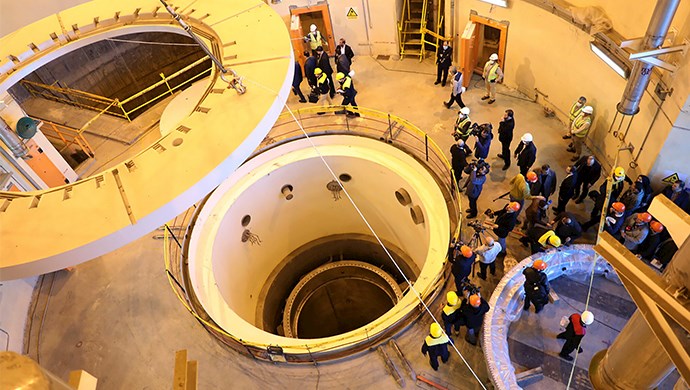Analysis by PMOI/MEK
Iran, September 27, 2021—Less than two weeks after reaching an agreement to allow United Nations inspectors to repair monitoring equipment at its nuclear facilities, the Iranian regime has backtracked on its commitments. According to a report by the International Atomic Energy Agency (IAEA), Tehran is preventing the UN nuclear watchdog from servicing its monitoring equipment at one of its facilities.
“The (IAEA) Director General (Rafael Grossi) stresses that Iran's decision not to allow agency access to the TESA Karaj centrifuge component manufacturing workshop is contrary to the agreed terms of the joint statement issued on 12 September,” the International Atomic Energy Agency said in a statement.
Grossi traveled to Tehran in mid-September and reached an agreement with the Iranian regime to proceed with the overdue servicing of its equipment in nuclear facilities. The agreement was meant to avoid further tensions with the international community ahead of the meeting of the IAEA’s Board of Governors and create the grounds to resume negotiations over Iran’s nuclear program.
At the time, Grossi described his talks with Iranian officials as “constructive” and “a measure to allow time for diplomacy.”
However, less than two weeks later, the events that have unfolded indicate that the regime has once again baited the international community to buy more time and avoid rolling back its dangerous and provocative behavior. The regime tricked the IAEA Board of Governors into not passing a resolution against it and gave nothing in return. Meanwhile, it has also continued to keep the lid on lingering issues about its nuclear program, including unanswered questions about traces of uranium found at three undeclared facilities. And it has refused to reduce its stockpile of highly enriched uranium based on the 2015 nuclear agreement with world powers, officially known as the Joint Comprehensive Plan of Action (JCPOA).
Kazem Gharibabadi, the Iranian regime’s envoy to the IAEA, responded to this latest report with belligerence that is characteristic of the mullahs’ regime. “Any decision taken by Iran on monitoring equipment is only based on political rather than legal considerations and the Agency cannot and should not consider it as one of its entitlements," Gharibabadi said on Twitter.
This is just one of a series of recent events that have proven the Iranian regime’s unwillingness to resolve issues surrounding its nuclear program.
In early September, the IAEA warned about the regime’s lack of cooperation and its growing stockpile of highly enriched uranium. The IAEA also warned that its verification and monitoring activities have been “seriously undermined” since February by Iran’s refusal to let inspectors access IAEA monitoring equipment. Some of the monitoring equipment need regular maintenance.
In another report in August, Grossi said that his inspectors had confirmed that Tehran has produced 200 grams of uranium metal enriched up to 20 percent.
In June, during the convention of the IAEA board of governors, Grossi warned, “The lack of progress in clarifying the agency’s questions concerning the correctness and completeness of Iran’s safeguards declarations seriously affects the ability of the IAEA to provide assurance of the peaceful nature of Iran’s nuclear program.”
In February, IAEA inspectors confirmed that the regime had produced 3.6 grams of uranium metal at the Isfahan nuclear plant. The regime claims that it needs highly enriched uranium for civilian purposes. But the European members of the 2015 nuclear deal, formally known as the Joint Comprehensive Plan of Action (JCPOA), expressed “grave concern” over the production of uranium metal and say that Tehran has no civilian need for it. They described the move as a “key step in the development of a nuclear weapon.”
Meanwhile, Iranian regime officials continue to make statements that further prove their lack of respect for their commitments.
In July, the regime’s outgoing president Hassan Rouhani said, “Iran's Atomic Energy Organisation can enrich uranium by 20% and 60% and if one day our reactors need it, it can enrich uranium to 90% purity.”
In late August, Ebrahim Raisi, the regime’s new president, appointed Mohammad Eslami as the new head of the Atomic Energy Organization of Iran (AEOI). Eslami is deeply tied to the Revolutionary Guards (IRGC), the military body that controls the regime’s nuclear weapons program. He was among a small group of IRGC officials that kickstarted the atomic bomb efforts in a meeting with A. Q. Khan, the “father of Pakistan’s nuclear program.”
In his recent speech to the UN General Assembly, Raisi reiterated that his regime would not come under compliance with the JCPOA until all sanctions were lifted. He made no mention of his regime’s dangerous stockpile of highly enriched uranium.
And the regime’s new foreign minister, Hossein Amir Abdollahian laid out the regime’s plan to continue to dither and delay by saying in early September that it will take “two to three months for the new administration to establish and do planning for any sort of decision” on continuing negotiations over its nuclear program.
While the international community continues to curb Tehran’s nuclear ambitions by turning a blind eye on its aggressions, the regime is exploiting its counterparts lack of firmness to continue its destructive nuclear weapons program. It has been proven time and again that this regime will not be reined in through concessions. It is past time that world powers deal with the regime in a language that it understands: strength and firmness.
As Mrs. Maryam Rajavi, the president-elect of the National Council of Resistance of Iran (NCRI), warned the world the Free Iran World Summit in July, “While the regime has been hiding its nuclear program by deceiving the world, the international community has been trying to stop or curb this project by granting concessions or by showing complacency.”
The Iranian regime’s nuclear program is not in the interests of the Iranian people, the people of the region, and the world community. As Mrs. Rajavi emphasized in her speech, “Any agreement that does not completely close down the regime's bomb-making, enrichment and nuclear facilities is unacceptable. And the Iranian people will not accept it.”





